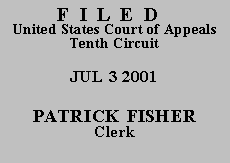

|
BILLY G. HUNTER,
v.
BOBBY BOONE, Warden;
OKLAHOMA PARDON AND
PAROLE BOARD, a/k/a Oklahoma
Parole Revocation Authorities |
|
Before HENRY, BRISCOE, and MURPHY, Circuit Judges.
In 1978, Billy G. Hunter was convicted of first degree murder in Oklahoma state court and sentenced to life imprisonment. Hunter was paroled in 1987 but his parole was revoked on February 7, 1996. On June 29, 1999, more than two years after the parole revocation, Hunter filed an application for post-conviction relief in Oklahoma state court.
On July 3, 2000, Hunter filed a petition for a writ of habeas corpus in the United States District Court for the Eastern District of Oklahoma. In the petition, Hunter claimed he was denied due process in the parole revocation proceeding. The district court dismissed Hunter's petition as untimely because it was filed outside the one-year limitations period set out in 28 U.S.C. § 2244(d). The court concluded that Hunter had failed to demonstrate any circumstances that would support the equitable tolling of the one-year limitations period. See Miller v. Marr, 141 F.3d 976, 978 (10th Cir. 1998).
Hunter now seeks a certificate of appealability ("COA") to enable him to appeal the district court's denial of his habeas petition. Although Hunter filed his petition pursuant to 28 U.S.C. § 2254, his claims present challenges to the execution of his sentence and should have been brought pursuant to 28 U.S.C. § 2241. Thus, we construe his petition as falling under § 2241. See Montez v. McKinna, 208 F.3d 862, 864-65 (10th Cir. 2000) (construing a petition filed pursuant to 28 U.S.C. § 2254 as a § 2241 petition).
Hunter, a state prisoner, is required to obtain a COA before he can appeal the denial of a § 2241 petition. See id. at 869. Hunter must make a "substantial showing of the denial of a constitutional right" before he is entitled to a COA. 28 U.S.C. § 2253(c)(2). Hunter may make this showing by demonstrating the issues raised are debatable among jurists, a court could resolve the issues differently, or that the questions presented deserve further proceedings. See Slack v. McDaniel, 529 U.S. 473, 483-84 (2000). Upon review of the relevant case law, Hunter's appellate brief and his application for a COA, and the entire record on appeal, we conclude that the issues raised by Hunter are not reasonably debatable, deserving of further proceedings, or subject to a different resolution on appeal. Accordingly, for substantially the reasons stated by the district court in its order dated January 8, 2001, this court denies Hunter's request for a COA and dismisses this appeal.
SUBMITTED FOR THE COURT
Michael R. Murphy
Circuit Judge
*. This order and judgment is not binding precedent, except under the doctrines of law of the case, res judicata and collateral estoppel. The court generally disfavors the citation of orders and judgments; nevertheless, an order and judgment may be cited under the terms and conditions of 10th Cir. R. 36.3.